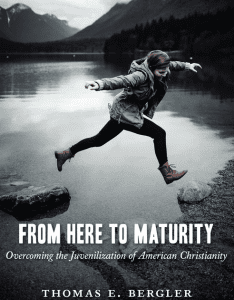 Sometime back I posted a review of Thomas Bergler’s The Juvenilization of American Christianity, and opined that it was short on proposals — we now have his proposals in From Here to Maturity: Overcoming the Juvenilization of American Christianity (Grand Rapids: Eerdmans, 2014).
Sometime back I posted a review of Thomas Bergler’s The Juvenilization of American Christianity, and opined that it was short on proposals — we now have his proposals in From Here to Maturity: Overcoming the Juvenilization of American Christianity (Grand Rapids: Eerdmans, 2014).
Let’s get this conversation going again by recalling what Bergler means by juvenilization:
Beginning in the 1930s and 1940s, three factors combined to create the juvenilization of American Christianity.
First, new and more powerful youth cultures created distance between adults and adolescents.
Second, in an attempt to convert, mobilize, or just hang on to their teenage children, Christian adults adapted the faith to adolescent tastes. As a result of these first two factors, the stereotypical youth group that combines fun and games with a brief, entertaining religious message was born. In the years since, this model of youth ministry has become a taken-for-granted part of church life.
Finally, the journey to adulthood became longer and more confusing, with maturity now just one among many options.
The result was juvenilization: the process by which the religious beliefs, practices, and developmental characteristics of adolescents become accepted — or even celebrated — as appropriate for Christians of all ages (1-2).
Do you think the church has been juvenilized? What is the #1 sign of it for you in your context?
Bergler knows the benefits of “juvenilization”:
It is important to realize that many benefits have come from injecting nore youthfulness into American Christianity. Church growth, mission trips, md racial reconciliation all received a big boost from the youth ministries of the past seventy-five years (2).
Youth ministries are laboratories of innovation that at their best keep churches vibrant and help them adapt to the unique challenges of each generation (3).
But the problem remains and the impact is the lack of growth into spiritual maturity:
It is important to realize that because of juvenilization, the problem of immaturity is no longer just a youth problem to be solved by adolescents, parents, or youth ministers (3).
Emerging adulthood, an expression that has become fixed in social analysis, is an important category and has been expounded in exceptionally helpful ways by Christian Smith (et al, Lost in Transition), and here is Bergler’s summary:
The result is a life stage that is beset with problems, losses, and even tragic outcomes, but populated by people who put a bold face on matters and insist they have “no regrets.” In particular, Smith and his research team found that American society is not preparing young people to become healthy, productive adults in five important areas of life: moral reasoning, higher life purpose, substance use, sexuality, and civic engagement.
First, they are unable to think clearly about moral matters. They can’t say what makes some things right and others wrong. About all they can say is that they “just know” or “just feel” when something is wrong. They’re pretty sure that each person needs to make up his or her own mind about morality.
Second, they unquestioningly accept consumerism and the American Dream and do not have any higher aspirations in life.
Third, many abuse alcohol, and a significant minority abuse drugs.
Fourth, they do not hold a high view of sex as something powerful that should be treated with care. Most follow a pattern of serial monogamy, and most romantic relationships involve sexual intercourse.
Fifth, they do not participate in politics, community service, or charitable giving. They hope to be more civically minded “someday,” just as they hope to achieve the American Dream with a happy family and lots of stuff (6).
And he sees these primary expressions of juvenilized faith, first in three short expressions and then in a more summarized form:
Adolescent Faith: “If I’m Having a Hard Time, [my faith] Makes Me Feel Better”
Emerging Adult Faith: “My Faith Is What’s Best for Me”
Adult Faith: “Religious Doctrines Get in the Way of Truly Relating to God”
They value a “relationship with God” above all and like the idea of “falling in love with Jesus.” They don’t see much value in the rules, strict reliefs, or structures of “religion,” although they like going to church if it helps them feel closer to God. They are largely uninformed about the teachings of their churches and may even see doctrine or theology as enemies of authentic spirituality. They like the sense of belonging and acceptance that they find in their congregations but are not very open to being corrected by fellow believers. Their God is always there to help them feel better about their problems, and this is one of the chief benefits they see in their faith. They like the idea of spiritual growth, but they may not know much about how to grow and may rate themselves more highly than they should. They are drawn to religious experiences that produce emotional highs and sometimes assume that experiencing strong feelings is the same thing as spiritual authenticity. They see themselves as in charge of their own search for a satisfying sense of religious identity. In short, American Christianity looks a lot like we would expect it to look if many Americans were stuck in a Christianized version of adolescent narcissism (25).











